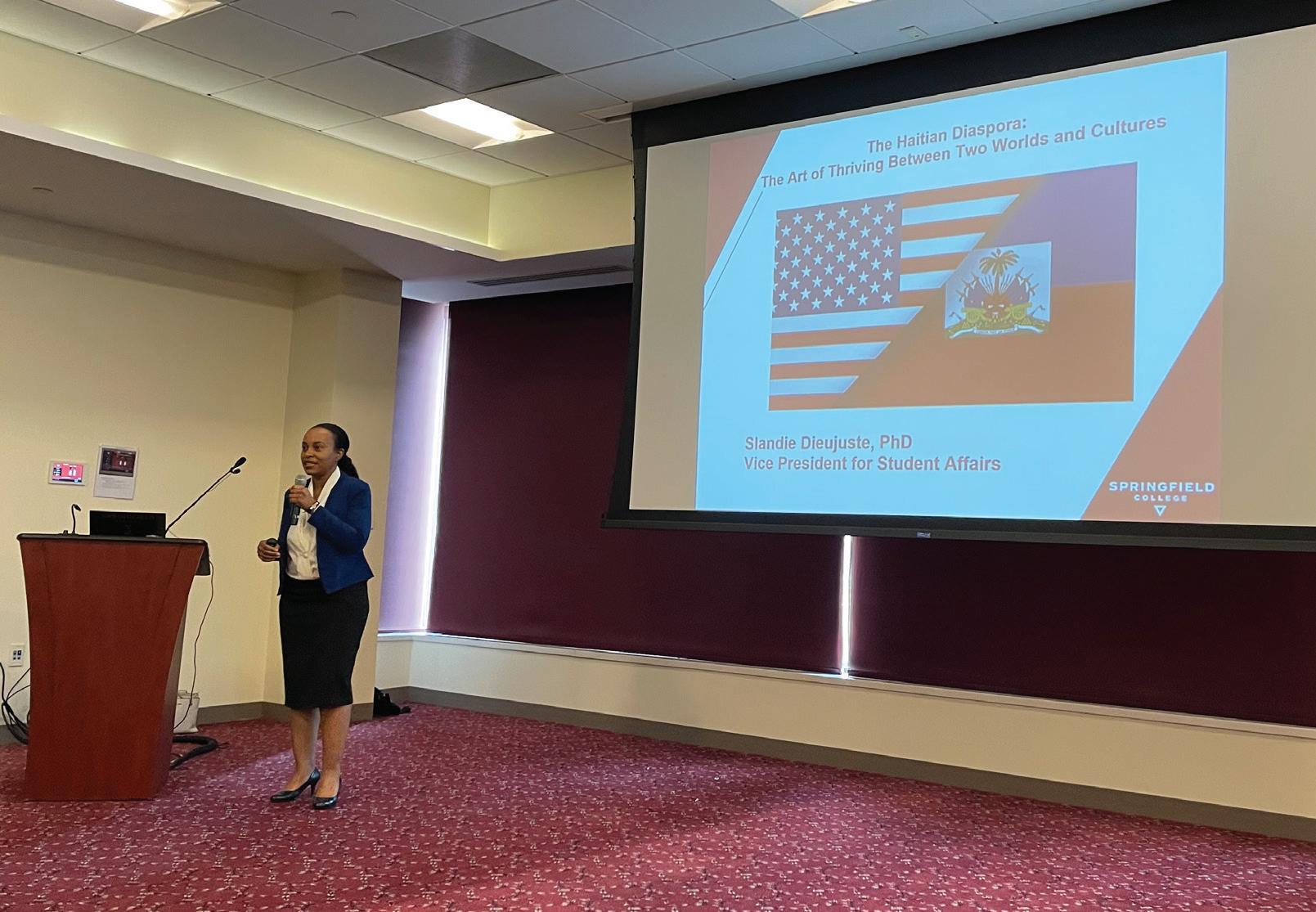
6 minute read
Get to know Jeff Monseau
A jack of all trades
Jeff Monseau, longtime archivist at Springfield, is the mastermind behind the protection and distribution of the College’s storied history.
Advertisement
Springfield College Archivist Jeff Monseau. (Photo Courtesy of Springfield College)
_ By Braedan Shea _ @othafishinthes1
On the lower level of Judd Gymnasia at Springfield College lies the office of the person who knows more about the history of the school than any book or document. Jeffrey Monseau, the campus archivist, is the mastermind behind preserving and allocating the college’s long, decorated history.
Monseau is responsible for collecting, preserving and providing access to the official records of Springfield College, along with other primary source materials that support the research interests and the humanities philosophy.
“Essentially – I do everything,” said Monseau. “I am a jack of all trades. I digitize materials, I put those materials online, I arrange materials so that anyone can get access, I describe them, I supervise interns, I work with all levels of the college, from the president through all the vice presidents and deans.”
Before he made his stop on Alden Street, Monseau never even intended to be an archivist.
“This is sort of my second career,” he said.
He attended the University of Massachusetts Amherst, where he majored in Classics; meaning that he studied Greek, Latin and Sanskrit. After graduating he worked in higher education for a short period of time but he wasn’t happy with what he was doing.
“It wasn’t really a career,” he said. “It was a job.”
A majority of this time was spent at home, where he was a stay-at-home husband and father. As his son grew older, Monseau realized that he was interested in learning about everything. He decided to follow his passion and attend Simmons University (then Simmons College), located in the heart of Boston, in hopes of becoming an archivist.
“[Simmons] has a graduate program. There are no programs that are archives only, so you become a librarian and you specialize in archives. Simmons offers one of the best programs out there,” Monseau said.
After graduating from Simmons, Springfield College was the first place to reach out to him. A place that, even as someone from Massachusetts, he had never heard of.
“A job opened up, I did research, I came down and interviewed, and it was a perfect match,” he said.
Monseau has loved his almost 14-year tenure at Springfield, but much like everyone else during these trying times, the ever looming Covid-19 pandemic has added a ripple into his job, making it a bit harder.
Before the pandemic, Monseau was able to work alongside a part-time staff member. But that person has been moved into the library in an effort to help students more during this period, leaving Monseau as something he refers to as the “lone arranger.”
The second, and much tougher change for him, has been that previously, nothing had been online. This was preventing those who wanted to know more about the College from doing so. He was then tasked with moving all of the physical documents into an online version.
“If you want to research something, you need to follow the trail,” Monseau said. “If you are just looking at the online stuff, that is just a small portion of what’s there and you’re not seeing the whole trail. So it makes it really hard to do research online, unless you digitize everything. And that is not easy to do. We are a small school that doesn’t have a lot of money, and it costs an awful lot to digitize everything. We have digitized a fair amount, but not enough to really do true research online. You have to do a hybrid, and that made it really tough for me to handle researchers.”
Although faced with these struggles, Monseau prefers to look on the brighter side of things.
“It’s helped me sort of deal with student requests. If you didn’t have the answers that you needed, we could have had discussions on how I could digitize whole folders for you. So in some ways, Covid was a positive.”
Despite these hard times, Monseau wants it to be clear what he is trying to do with his work: “I have tried really hard to let people know what this school was.”
The art of thriving between two worlds
Dr. Slandie Dieujuste, Springfield College’s Vice President of Student Affairs, hosted a lecture about her home country of Haiti.
__ By Jac St. Jean __ @jacsaintj
Sounds of Haitian music accompanied the buzzing of students and faculty in the Dodge Room of the Campus Union on Thursday, Feb. 10, as Vice President of Student Affairs Dr. Slandie Dieujuste prepared to present “The Haitian Diaspora: The Art of Thriving Between Two Worlds and Cultures.”
Dr. Calvin Hill, Vice President of Inclusion and Community Engagement, began the event and introduced Springfield College student-athlete Mikaili Charlemagne, who then introduced Dr. Dieujuste.
Dr. Dieujuste started with a warm welcome to the crowd, and addressed a few of her key objectives in this talk about the Haitian diaspora. One common highlight that she presented about her home country of Haiti was that it is the poorest country in the western hemisphere.
“That is something that is almost always highlighted in every video clip, every newspaper article you read [about Haiti], without so much a thought to explain why that might be,” uttered Dieujuste.
This reason behind the poverty of Haiti derives from the year 1804, when Haiti declared its independence from France. This was the first time that a Black nation gained independence. Haitian people expelled France from the island, but the conflict between the two nations was not over. Two years after separating from France, Haiti was forced by the European country to pay them for a loss of labor.
Dieujuste continued through the history of Haiti which led to the late 1900s, where many Haitians began to migrate to the United States in the 1960s, and again in the 1980s. To display the continuance of the Haitian diaspora to this day, Dieujuste showed a picture of Haitian migrants being attacked by U.S. Border Patrol agents on horseback for crossing the border from Mexico to the United States.
The long history of the Haitian diaspora stigmatized Haitians and caused widespread discrimination across the United States that is still seen to this day.
“It’s nothing really that’s in the past,” Dieujuste exclaimed. “Just over the summer in May, there was a twelve-yearold boy in Brooklyn who had come to this country just a couple years ago. He was beaten, bullied, and died because he was Haitian and spoke with an accent… this [diaspora] is still very much happening.”
The Haitian diaspora personally affected Dieujuste in many ways. She came to the United States when she was nine years old, and went to elementary school in Boston, Mass. Dieujuste, her brother, and other Haitian children at her school were beaten by their classmates and discriminated against by their teachers.
“I decided to commit cultural suicide,”

Dr. Slandie Dieujuste addressing the audience. The lecture took place on Feb. 10. (Photo Courtesy Jac St. Jean)



